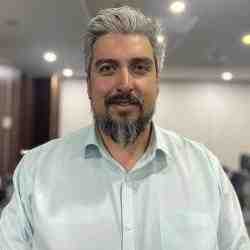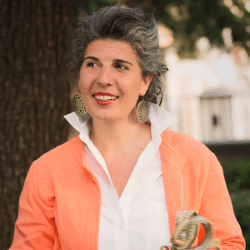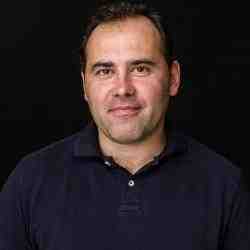Introduction
Andras has created a new strategy and instrument to tip the criminal justice sector and build a new culture of delivery to bring justice for the world's worst crimes. He is leading to a paradigm shift in international investigations, improved global standards, increased local ownership over investigations and the justice process, and new channels for global cooperation.
The New Idea
Over the past two decades, the international community has become increasingly committed to hold accountable the perpetrators of mass atrocities (genocide, war crimes, crimes against humanity) and serious human rights violations. International law has also evolved and mechanisms to obtain justice for victims and their families have been created or strengthened. Despite these advances, those who commit these horrendous crimes are far too rarely held to account. Justice is only possible if genuine, thorough, professional and impartial investigations into these crimes are carried out as soon as possible when there are windows of security and political opportunity, and if information pertaining to the crimes is identified, collected and preserved properly. Countries emerging from conflict are often ill-equipped to conduct such investigations on their own. International institutions mandated with addressing mass atrocity crimes often face challenges in identifying, mobilizing and rapidly deploying professionals with the knowledge, skills and expertise to investigate these types of crimes, including in interviewing victims and witnesses without detriment to their safety and dignity.
The idea behind creating Justice Rapid Response (JRR) was to provide a tool to fill this gap. In operation since 2009, JRR is a facility that brings together governments, international organizations and civil society to recruit human rights and criminal justice experts from around the world, train these experts to work under international law and conflict-affected situations, certifies them to a roster, and makes them available for rapid deployment to assist with investigations of international crimes. In this way, JRR helps ensure the genuineness and credibility of the accountability process, which is essential to the delivery of justice.
No comparable mechanism exists. Without JRR, States and institutions would have to rely mainly on databases of consultants that are not appropriately trained. JRR differs from existing practice in a number of ways, including:
1) Using a multilateral multi-stakeholder model that is agile, flexible and effective. With over 70 States and 30 international organizations and civil society organizations engaging in its activities, JRR benefits from the combination of agility and flexibility of civil society; the influence of States; and the global reach of international institutions.
2) Carefully selecting professionals with relevant backgrounds and providing them with specialized international crimes investigation training. The rigour of the vetting process used to select, train and certify experts to the roster ensures its quality. Over 60 professional categories are included on JRR’s roster, including prosecutors, legal advisors, witness protection specialists, military advisors, forensic doctors, sexual and gender-based violence investigations, gender advisors, and police officers.
3) Diversity: the 425 experts currently on JRR’s roster come from all corners of the world. Over 85 nationalities are represented, and over 60 languages. Forty percent of the experts are from a global South country, and over half are women. Such diversity is both unique and essential to being able to provide experts who possess the expertise, investigative skills, cultural awareness, language skills and intercultural relations competencies needed to effectively assist or lead an investigation in conflict situations, which includes interviewing victims and witnesses with sensitivity and without causing further harm. For example, a French-speaking female African SGBV expert is likely best suited for an investigation into mass rapes in a place like Guinea, particularly if most victims are female and where victims of SGBV may be reluctant to speak to investigators, due to cultural taboos, fear or reprisals or rejection by their family.
4) Making expertise available quickly, when there are windows of opportunity, is key to successful investigations. JRR relies mainly on active duty professionals whose training and certification to the roster is based, in part, on the prior knowledge and willingness of their employers to make them available for short-term deployments when requested by JRR to assist with an investigation or inquiry. This relationship with employers allows JRR to achieve a higher “dispatch” rate (approx. 70%) than conventional rosters. Through the training and rostering of experts who are selected to ensure the availability of a broad range of knowledge, skills, expertise and competencies, JRR is “front-loading” work that traditionally was not being done until a specific problem or need had been identified. This is the only way to respond rapidly and avoid missing the windows of opportunity that exist to investigate mass atrocities.
The Problem
While the international legal framework and political will to address genocide, war crimes, crimes against humanity and serious human rights violations have grown over the past two decades, the reality is that perpetrators of such crimes are seldom held accountable for their actions. Impunity for crimes of such gravity is a barrier to sustainable peace, security and stability. When credible steps are not taken to hold perpetrators to account for their actions, the message to society is that such acts are tolerable, even acceptable. This leads to the normalization of violence, which in turn serves to perpetuate it. This makes post-conflict societies particularly vulnerable to slipping back into conflict.
Thanks to the work of JRR, efforts to address mass atrocity crimes perpetrated in conflict situation have a considerably greater chance of succeeding in securing accountability for perpetrators and delivering justice to victims and their families. The credibility of accountability processes depends on prompt, thorough and impartial investigations being conducted, something that States emerging from conflict are rarely equipped to do without external assistance. Until JRR was created, there was also no effective mechanism in place that would enable the international community to provide such assistance. Institutions like the International Criminal Court are courts of last resort, intended to step in only when the concerned State itself is unwilling or unable to investigate. States seeking to fulfill their responsibility under international law to address mass atrocity crimes now have a resource to turn to in order to access the skills, knowledge and expertise they may be lacking to adequately carry out an investigation. By coming to JRR, they can obtain experts who not only have specialized training in international investigations, but who also know the country and the region, can speak the local language fluently, know how to interview victims and witnesses without causing further harm, are able to effectively integrate a multidisciplinary and culturally diverse team, and know how to adequately integrate gender considerations. When JRR experts are deployed to assist States directly, their role typically includes mentoring to local authorities in addition to providing technical assistance. This peer-to-peer coaching is key to helping the government develop the capacity to conduct future investigations on its own without external assistance. Moreover, the impact of the assistance provided by JRR is far greatest when it is requested by the State itself. Local ownership of the accountability process fosters sustainable institutional capacity building and transition from conflict to peace.
While it is encouraging to see that much of the growing demand for JRR experts comes from States trying to conduct their own investigations, there remain cases where international institution have to step. In these situations, JRR has proven itself a valuable tool for multilateral institutions, who often find themselves challenged to mobilize enough staff for a mission and/or lack certain types of expertise or skills by providing surge capacity and access to hard-to-find specialized expertise. For example, JRR has provided experts specialized in a range of areas such as SGBV investigations and forensic sciences to assist with UN Commissions of Inquiry and ICC investigations.
The Strategy
Going forward, JRR’s main strategies include:
1. Leveraging current partnerships and developing new strategic partnerships using innovative and flexible approaches to optimize effectiveness in assisting States and institutions end impunity for mass atrocities, identify emerging needs and design appropriate responses.
2. Refine and evolve programs, systems and working methods on an ongoing basis to maintain excellence in roster management and deployment facilitation. In particular, focus on developing effective approaches for providing direct investigative assistance to interested governments.
3. Build a community of practice by establishing a platform to connect JRR’s 425 experts and foster the exchange of lessons learned, information on emerging challenges, and ideas on potential solutions.
4. To ensure the sustainability of its operations and its continued ability to rapidly and flexibly respond to requests for expertise, JRR is working to build a stable and predictable funding base.
Over the next 5 to 10 years, JRR’s vision is that access to justice will not be limited by the timely availability of criminal justice experts. More specifically, JRR hopes it will have helped:
- Build a critical mass of criminal justice experts worldwide with experience investigating international crimes.
- States develop the institutional capacity needed to undertake their own investigations.
- Ensure investigations are systematically conducted where international crimes perpetrated, and that SGBV addressed and gender adequately integrated.
- Continue to shift the paradigm of what we can achieve in the field of international justice. There is no reason why the worse crimes known to humanity cannot be treated to the same standard that we expect for a burglary in domestic legal systems.
- Reinforce respect for Rule of Law, by making accountability for perpetrators the norm rather than the exception.
- Make transitional justice processes effective in preventing reoccurrence of conflict.
- Make progress toward sustainable peace.
In just over four years since it became operational in 2009, JRR has already achieved impressive results:
• Designed, developed and delivered, in collaboration with its exclusive training partner the Institute for International Criminal Investigations (IICI), a total of 24 international investigations training courses in all regions of the world to over 500 human rights and criminal justice professionals.
• Built a diverse roster which now includes 425 experts representing over 60 professional categories, over 85 nationalities, over 60 languages, half of them women, and 40% of them from the global South.
• Established a successful partnership with UN Women which led to the creation of the JRR-UN Women SGBV Justice Experts Roster, within the JRR roster, and now contains 105 experts. A unique, highly specialized training curriculum on the investigation of SGBV as international crimes was developed as part of this partnership in collaboration with the IICI. Four of the 24 training courses delivered by JRR focused on SGBV. Forty percent of experts deployed to date are SGBV investigators.
• Fifty-two experts have been deployed through JRR through 34 separate missions to date. These include surge capacity deployments (such as UN Commissions of Inquiry, including through UN Women for SGBV expertise, and ICC investigations); and deployments directly to States (including to the governments of Haiti, Kyrgyzstan, Mali, and Colombia).
• Developed new models of collaboration, including trilateral cooperation (where one State financially supports provision of JRR expertise to a conflict-affected partner country), and complementarity missions, where JRR is putting together teams of experts to provide short to medium-term assistance and mentoring to States seeking to conduct national accountability processes.
• The number of deployments facilitated by JRR tripled between 2012 and 2013, and already half way through 2014 are exceeding demand for 2013 at the same time. This is a clear indication of the relevance and effectiveness of the work of JRR. Notably, increased demand is coming largely from States themselves who are seeking to fulfill their primary responsibility under international law to address mass atrocity crimes.
These results have contributed to the achievement of JRR’s desired impact. The impact of JRR’s work since 2009 includes:
• States and multilateral institutions have access to the expertise needed to conduct prompt, thorough and impartial investigations into international crimes.
• The capacity to address international crimes has increased, both globally and locally. The JRR roster has enhanced the capacity of the international community to strengthen accountability for such crimes. At the national level, the over 500 experts who have been trained through JRR are able to apply the knowledge and skills acquired to strengthen institutional capacity in their home government or organization, regardless of whether they are deployed to a mission.
• SGBV crimes in conflict situations are more systematically investigated and reported, and gender considerations more effectively integrated in inquiries and investigations. Most of the UN Commissions of Inquiry have used SGBV experts trained by JRR in partnership with UN Women and IICI. It has now become the norm to include SGBV expertise in multilateral mechanisms, and an increasing number of States are integrating gender expertise in national accountability processes. The importance of integrating gender expertise in the planning stages of such processes is also increasingly being taken into account.
• Information pertaining to international crimes collected and preserved properly is used as evidence in judicial proceedings to hold perpetrators accountable. For example, the ICC recently confirmed 18 charges against Bosco Ntaganda in its investigation into the conflict in the Democratic Republic of the Congo. Six of these charges relate specifically to rape and sexual slavery, owing to the work of the JRR expert deployed to assist the ICC.
• JRR’s work has led to a paradigm shift in international investigations leading to improved global standards. For instance, use of experts with specialized training in international investigations is increasingly recognized as the norm for accountability processes. Likewise, there is a growing expectations that investigations teams will include experts who know the affected country and the local language. As evidence of this shift, institutions like the ICC are even changing their recruitment and training practices to ensure their staff have international investigation experience.
The Person
Andras Vamos-Goldman was born and raised in Hungary until the age of 11 in the 1950s and 1960s. His parents were both Holocaust survivors, with much of his family having perished in concentration camps. Emigrating to Canada in 1968 was not, however, the "Eureka" moment. Growing up in the economically impoverished Atlantic region, Andras learned that like all cats at night, all systems are "grey". Dogmatic ideology, sloganism, jingoism are refuges of scoundrels, and Andras was more comfortable in a world measured by deeds and accomplishments rather than positions and titles. He had always been drawn to international affairs, and after Law School, joined the Canadian diplomatic service, with assignments at the UN in New York, East Africa, the legal bureau in Ottawa, and Washington, D.C. While the work was varied and interesting Andras felt that he was not doing what he really wanted, what he really believed in. He eventually left to go to the private sector and corporate law. Then in 1996 he saw that negotiations were beginning on a permanent international criminal court, and he knew immediately that international justice was his calling.
Andras did everything he could to get involved, and in 1997 managed to be appointed political coordinator of the Canadian mission to the UN in New York, at the time the Rome Statue was being negotiated. This allowed him a rare insight into global realpolitik, on issues such as Iraq, Kosovo and Sierra Leone, and working day to day in an environment populated by people like Richard Holbrook, Sergei Lavrov, Jeremy Greenstock, Selso Amorim, Danilo Turk and of course, Kofi Annan. In this job and subsequently as legal advisor, Andras was able to make his mark for the first time as an entrepreneur in coming up with the "management committee" solution that enabled the Sierra Leone Special Court (created under only voluntary contributions) to come into existence in spite of resistance from the UN and Members States. Andras became the first chair of the Management Committee, which allowed Member States a closer scrutiny of how money intended for the court was spent. This is why this court ended up costing a fraction of what the ICTY/R cost. He also played a part in setting up the ICC as an institution, representing the Chair of the PrepCom and negotiating with the Netherlands.
A stint with former Canadian Foreign Minister Lloyd Axworthy as his law and policy advisor at the Liu Institute at the University of British Colombia gave Andras a platform to continue to look into how to improve the delivery of international justice. In the "Vancouver Dialogues" Andras helped look at gaps, and how to plug them. It was at one of these meetings that the ideas for JRR emerged. Andras was one of the people who helped generate the notion that without expert, trained, impartial and timely investigation, accountability process will not be credible, and justice will not be done. Among these people he was the only who stuck all the way with the development of this idea from a topic at meetings, to the topic of meetings of its own, to intergovernmental meetings, conferences, planning sessions, and promotion, promotion, promotion. Andras headed a team that was responsible for JRRs feasibility study in 2005, and while he had a number of jobs at the same time, the goal was always to try to make it operational.
The opportunity came in 2009, and starting from scratch, JRR has grown exponentially. Currently it has 73 participating states and some 30 organizations, it has held 24 training courses that have given JRR a roster of experts above 400, from 87 countries, with 40% global South and 53% women. JRR has had 34 successful missions, and is now the surge capacity providers of timely international justice expertise to the ICC, OHCHR, UN Women, UNDPA etc. JRR is also helping States directly, and is coming up with new ways to assist (trilateral cooperation, complementarity project) as well as new areas of work (asset recovery). JRR is making a difference in rendering international justice more effective, and Andras is confident that his knowledge, experience, dedication, creativity, together with the energy of his team, can help achieve a lot more.




